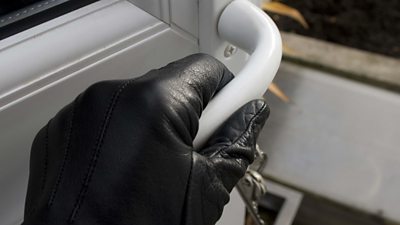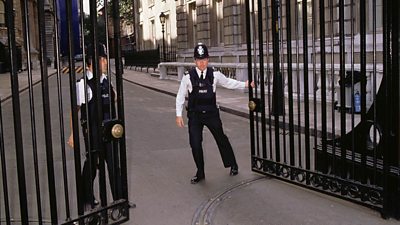It is important to learn to recognise vulnerable situations in order to avoid them. For example, people are relatively vulnerable when answering the door at their home, when preparing to drive off in their car, and at other times when their movements can be predicted.
Security (Personal)
There are some simple routine precautions to help prevent crime. A personal security checklist is also available to use.
Handbags
- Do not carry a large sum of cash in your bag. If you have to carry a large amount of money, be sure to distribute it among several pockets
- Do not leave handbags unattended, especially on backs of chairs in pubs and restaurants
- If your bag has a shoulder strap, wear it across your body with the bag in front of you and the opening against your body.
Using Cash Dispensers (ATMs)
- Be as discreet as possible when using cash dispensers
- Always choose machines that are well lit or, if possible, withdraw your money during daylight hours
- Do NOT stop to count your money in the street - always find a more secure spot out of the public gaze
- Be aware of persons overseeing you or attachments that may read your PIN code.
Vehicle Security
- Do not leave valuable personal possessions in your car
- If it is unavoidable to leave valuable items in your car, lock them securely in the boot out of sight
- Lock all doors when in slow moving or stationary traffic
- Do not leave laptop computers, mobile phones or handbags on a passenger seat or in a foot well, and expensive watches or jewellery on view
- Where possible, park in a serviced car park with visible security presence, or in a public area where other pedestrians may deter thieves
- When fitted, use vehicle immobilisers and steering wheel/gear stick locks.
What should I do when facing aggression?
To diffuse the situation try the following:
- DO appear calm
- DO avoid prolonged eye contact
- DO be aware of the tone of your voice
- DO NOT sound patronising
- DO speak slowly and softly
- DO avoid long sentences
- DO keep your distance
- DO NOT touch anyone threatening you
- DO be conscious of your posture, try to appear relaxed
- DO dissuade others escalating a situation by words or actions
- Distract
- try to change the subject
- Listen: the problem may be poor communication
- Negotiate: try a compromise
- Consider these additional factors
- Take special care if the aggressor appears under the influence of drugs or alcohol, or appears mentally unstable they may behave in an unpredictable way.
If weapons are produced you must:
- Withdraw to a safe area
- Summon help
- Warn others
- Call for police assistance, if possible without giving further alarm.
What should I do if I'm attacked in my car?
How to react:
- Don't fight back - hand keys over and stay safe
- If deliberately bumped drive to nearest police station or busy place
- Only open the window a little if you need to speak to someone outside.
These actions may help:
- Look and listen when at traffic lights
- Look away if someone tries to attract your attention
- Hit their hand or fingers if someone tries to force windows open
- Use horn and hazard lights if forced to stop by another car
- Drive to police station or somewhere crowded if you are being followed
- Note model, colour, registration of car and description of driver.
How not to be a victim:
- DO have an action plan be observant and think in advance how to react
- DO always drive with the doors locked and windows closed
- DO NOT leave keys in the ignition when away from the car
- DO park in well lit unobscured area, preferably observed by cctv
- DO NOT leave possessions on display
- DO place all evidence of gender in the boot before leaving car
- DO have your car keys ready, but not obvious, when returning to your car
- DO keep the car serviced to reduce risk of breakdown
- DO take extra care in slow traffic and when stationary at lights or junctions.
Consider:
- Having clear plastic film fitted inside of side windows
- Fitting a tracking system to aid recovery and prosecution.
A night out - What should I do to stay safe?
When out with friends or colleagues to have an evening of fun, keep these thoughts in mind:
- DO stay in the company of friends
- DO look out for "table surfers" who want to distract you and steal from your bag
- DO loop your bag under a chair leg or use the bag clip if provided
- DO carry only enough cash for the evening
- DO use a cab company you know, and pre-book if possible
- DO NOT leave bags or briefcases unattended or out of site
- DO NOT accept drinks from strangers unless you can see what's gone into the glass
- DO NOT leave drinks unattended
- DO NOT get in a taxi that stops you in the street
- DO NOT ask strangers to take you to a taxi office
- DO NOT reveal personal details to the taxi driver.
Also consider these stay-safe rules:
- Stay in control and don't get careless if you're full of good cheer. The same goes if you've had an argument and left early
- Be aware of your surroundings; stay in well lit places, and with other people
- Keep your possessions out of sight; remember this if you have to draw cash from an ATM, and guard your PIN, card and cash
- Take as few credit cards with you as possible (less to get stolen)
- Leave your Drivers Licence at home, and anything else with your address on it, so that a thief will not be able to use the keys to get into your home
- Enable the PIN lock on your mobile so it cannot be used if stolen
- The crowds at clubs and bars, spilling out from theatres and cinemas, and at music venues, are happy hunting grounds for thieves. Look out for pickpockets if you are approached by beggars
- If you do not know the area, be careful if you stray into the surrounding streets
- Do not let them spoil your enjoyment stay safe and have a good night out.
What can I do to make my home more secure?
Make it difficult for the burglar...
- DO check your fences and gates are in good condition
- DO keep your shed and garage locked
- DO NOT leave ladders outside
- DO check that doors are solid construction
- DO replace ordinary glass door panels with laminated glass
- DO fit and use a door chain
- DO fit and use a five lever mortice deadlock
- DO fit and use key operated locks on even the smallest opening window
- DO glue in louvre window slats or replace with fixed window pane
- DO use time switches on lights indoors
- DO change the locks when you move in to a new house or flat
- DO NOT leave valuables in sight
- DO NOT hide a spare key anywhere outside
- DO NOT advertise your absence when on holiday, at work or shopping.
Consider:
- Planting a thorny hedge along your boundary
- Fitting a high gate to side passages
- Means of escape in case of fire
- Fitting hinge bolts, viewers and letterbox cages to front doors
- Getting advice on securing patio doors
- Marking your post code on your property
- Taking pictures of valuables
- Checking you are fully insured
- Joining Neighbourhood Watch
- Getting crime prevention advice from local police.
If you see signs of a break-in:
- DO NOT go in or call out the intruder could still be inside
- DO go to a neighbours to call the police.
Recommended links
-
[Βι¶ΉΤΌΕΔ Network only]
-
Academy: Safety of Women Journalists Video on security issues for women covering stories alone / abroad
-
[Βι¶ΉΤΌΕΔ network only]
-
Guide to crime prevention and personal safety
Personal security topics
-
 Security (Personal) Measures you can take to help protect yourself
Security (Personal) Measures you can take to help protect yourself -
 Security (on Location) Advice for maintaining security on productions
Security (on Location) Advice for maintaining security on productions -
 Covert Filming A guide to a genre of programmes which involve investigative journalism, surreptitious and covert filming or recording, creating potential personal security risks.
Covert Filming A guide to a genre of programmes which involve investigative journalism, surreptitious and covert filming or recording, creating potential personal security risks. -
 Courts of Law A guide to working in, outside or, around courts following a news story.
Courts of Law A guide to working in, outside or, around courts following a news story. -
 Demonstrations, Protests, and Crowds Βι¶ΉΤΌΕΔ Safety has a whole host of safety guidance to assist teams when they are planning a deployment to a demonstration or protest.
Demonstrations, Protests, and Crowds Βι¶ΉΤΌΕΔ Safety has a whole host of safety guidance to assist teams when they are planning a deployment to a demonstration or protest. -
 Door-Stepping The risks of obtaining an interview, or piece to camera, from a contributor without prior arrangement or agreement.
Door-Stepping The risks of obtaining an interview, or piece to camera, from a contributor without prior arrangement or agreement. -
 Harassment and Stalking Guideline to harassment and stalking, including internet / social media trolling.
Harassment and Stalking Guideline to harassment and stalking, including internet / social media trolling. -
 Lone Working This Guideline sets out the hazards and precautions to be considered when lone working, whether it is in the office, on location or overseas.
Lone Working This Guideline sets out the hazards and precautions to be considered when lone working, whether it is in the office, on location or overseas. -
 Security on Location Guideline provides measures to help mitigate the security threats associated with production activities on location, including door-stepping, covert filming, working with crowds and public order issues.
Security on Location Guideline provides measures to help mitigate the security threats associated with production activities on location, including door-stepping, covert filming, working with crowds and public order issues. -
 Violence and aggression Guidance on dealing with violence and aggression
Violence and aggression Guidance on dealing with violence and aggression
More from SSR
-
Your platform to record accidents, risk assessments, assurance monitoring and inspections
-
Safety Equipment Stores Just one number to call: 0844 800 8875
-
Βι¶ΉΤΌΕΔ Safety Guidelines An A-Z of Βι¶ΉΤΌΕΔ's Health and Safety Guidelines
-
Safety Advice Line: 0370 411 0464 Email: safety@bbc.co.uk
- A-Z of Βι¶ΉΤΌΕΔ Safety Guidelines
- Accident Reporting and Investigation
- Βι¶ΉΤΌΕΔ Health & Safety Policy
- Contractors (incl. vetted lists)
- Contributors
- Fire Safety
- Freelancers
- Independent Production Companies
- Risk Assessment
- Safety Alerts
- Safety Responsibilities
- Safety Training
- Sets & Premises Safety Guide
Events guidance - key links:
- Exhibitions
- General Guidance
- Indoor Location Recce Checklist
- Outdoor Location Recce Checklist
- Major Incidents & Emergency Planning
- Marketing and Promotional
- Noise Exposure
- Planning and Management
- Responsibilities
- Responsibilities Form
- Laser Lighting Effects
- Strobe Lighting
- Temporary Stages and Rostra
Health topics - key links:
- (Βι¶ΉΤΌΕΔ network only)
- Contributors Fitness to Participate
- Display Screen Equipment (DSE)
- (Βι¶ΉΤΌΕΔ network only)
- First Aid and Welfare on Location
- International Travel - Risks & Health
- Manual Handling
- Mental Health: Βι¶ΉΤΌΕΔpage
- (Βι¶ΉΤΌΕΔ network only)
- Personal Health and Wellbeing
- Pregnancy
- Psychological Trauma Support & Trauma Risk Management (TRiM)
- Tiredness and Fatigue
- Travel Health Contacts
Βι¶ΉΤΌΕΔ High Risk - key links:
- CBRN and Industrial Spills
- Covert Filming
- Crisis Management and Security Support
- Demonstrations, Protests and Crowds
- Disaster Coverage
- Door Stepping
- (Βι¶ΉΤΌΕΔ network only)
- (Βι¶ΉΤΌΕΔ network only)
- Public Order
- Safety Equipment Stores
Βι¶ΉΤΌΕΔ Journalism - key links:
Βι¶ΉΤΌΕΔ Productions - key links:
- Aerial Filming and Airfields
- Animals: Displaying and handling for performance
- Boats: Working on
- Children and Young People
- Driving
- Electrical Equipment and Systems
- First Aid and Welfare on Location
- Food Safety (Cooking and Catering)
- Remote Location Working
- Roads and Streets: Working by
- Security of Productions on Location
- Stunts
- Tiredness and Fatigue
- Unmanned Aerial Systems (UAS aka Drones)
- Vehicles: Recording in, from and around
- Working at Height: Mobile Elevating Work Platforms
- Working at Height: Tower Scaffolds
Βι¶ΉΤΌΕΔ Radio - key links:
- (Βι¶ΉΤΌΕΔ Network only)
Βι¶ΉΤΌΕΔ Security - key links:
Βι¶ΉΤΌΕΔ Sport - key links:
About this site
This site describes what the Βι¶ΉΤΌΕΔ does in relation to managing its health, safety and security risks and is intended for those who work directly for the Βι¶ΉΤΌΕΔ.
It is not intended to provide instruction or guidance on how third parties should manage their risks. The Βι¶ΉΤΌΕΔ cannot be held liable for how this information is interpreted or used by third parties, nor provide any assurance that adopting it would provide any measure of legal compliance. More information
Some links on this site are only accessible when connected to the Βι¶ΉΤΌΕΔ network
